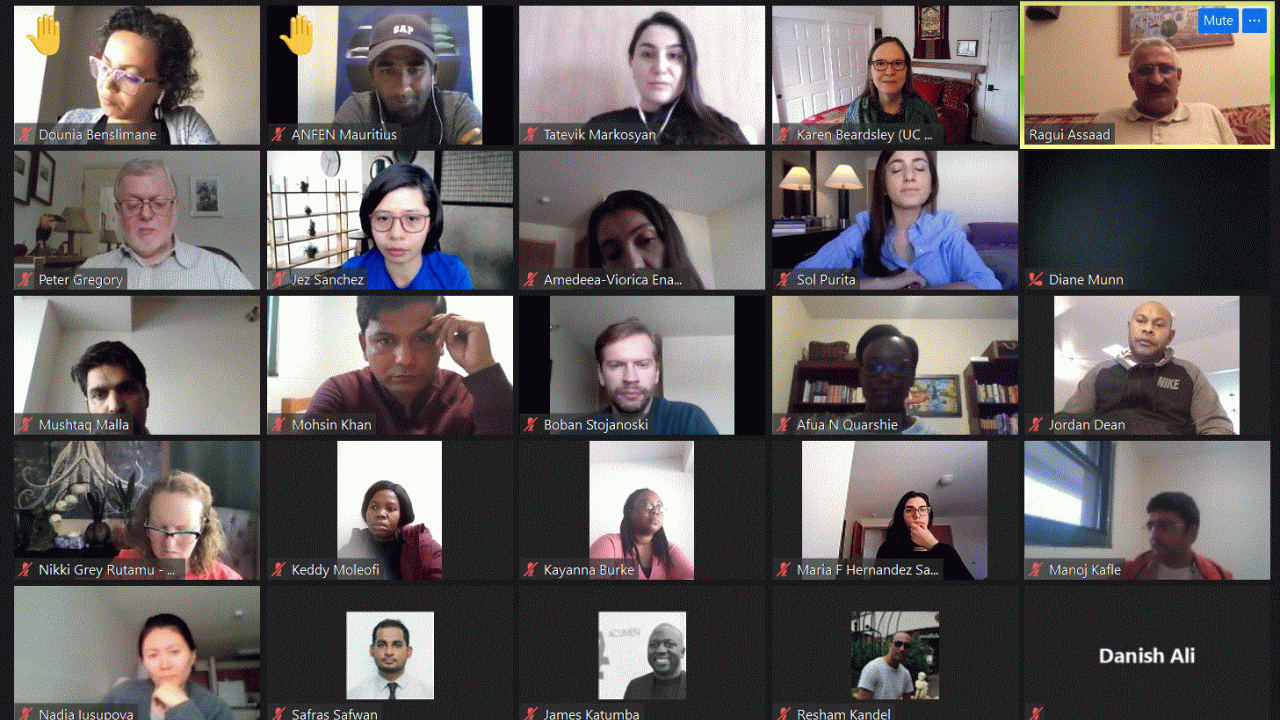
UC Davis Partners with Cornell, Syracuse, University of Minnesota, and Vanderbilt for Humphrey Fellowship Multi-Campus Seminar Series
By Jana Sanders Perry, communications manager, Global Affairs
Building on the U.S. Department of State’s strategic goals to assist Hubert H. Humphrey Fellows in developing and refining tangible career skills, five host universities of the Humphrey Fellowship Program have joined together to provide a comprehensive Multi-Campus Seminar Series.
During the 16-week program, the University of California, Davis, Cornell University, Syracuse University, University of Minnesota, and Vanderbilt University are hosting sessions on topics such as conflict resolution, strategic communications, and understanding unconscious bias. The series provides weekly fellow-to-fellow co-learning and networking opportunities among cohorts, bringing together approximately 55 professionals from 40 countries in a virtual space.
“Collaborating across Humphrey host campuses is something we have been interested in for some time, but have had difficulty organizing given conflicting schedules and active, in-person programming at all our campuses,” said Karen Beardsley, director of the Humphrey program within Global Affairs at UC Davis.
This year, with nearly everything moved to the online platform due to COVID-19, the opportunity resurfaced. Nikki Grey Rutamu, associate director of the Humphrey Program at UC Davis, spearheaded this multi-campus series. In fall 2020, Grey Rutamu approached other universities in the hope of taking a cross-campus approach to support Humphrey Fellows. Shortly thereafter, it was determined that UC Davis would not be able to host Humphrey Fellows in-person due to concerns around California’s rising COVID-19 cases. UC Davis Humphrey Fellows were instead offered the opportunity to postpone until next year or attend the program through another host campus. Grey Rutamu continued to lead the effort, and the Multi-Campus Seminar Series became a way to supplement content and enrich the experience for fellows at universities continuing in-person programs.
“With prolonged co-learning, fellows can now network and discuss across the various disciplines and learn from an even greater pool of experts, all while across the country from one another in these extraordinary times,” said Grey Rutamu.
Four other Humphrey Program host universities, still operating traditional in-person Humphrey Fellowship Programs in 2020-21, joined the series to provide its cohorts with this supplemental content. Together, they acknowledge that during the COVID-era, virtual programs such as the Multi-Campus Seminar Series provide a unique experience for networking and learning.
“The Humphrey cross-campus collaboration enables fellows to expand their network and connect with their Humphrey colleagues from other campuses,” said Margaret Lane, assistant director of Executive Education Programs and Humphrey Fellowship Program Director at Syracuse University. “The topics offered also provide relevant professional development skills that not only fit within the State Department’s goals but also enhance fellows’ perspectives and experiences.”
Each week the series addresses a different topic and area of practice, exposing the diverse cohort of fellows from varied backgrounds and professional affiliations to a range of topics and speakers. The cross-campus group has already held sessions on Understanding the UN Sustainable Development Goals (SDGs) with Professor Ragui Asaad of the University of Minnesota, Proposal Development with Professor Peter Gregory of Cornell, Conflict Resolution with Catherine Gerard of Syracuse, and the Power of GIS with Karen Beardsley of UC Davis.
“One of the best things about the Multi-Campus Seminars is bringing together on one platform the diverse perspectives and expertise of fellows and professors from various campuses,” said Danish Ali Bhutto, a University of Minnesota Humphrey Fellow from Pakistan. “I’ve managed to learn very useful soft and hard skills for self-reflection, and personal and professional enrichment. Introduction to the frameworks like GIS, workshop on proposal writing and self-assessment tools for emotional intelligence and conflict resolution are going to add a lot of value to the way I work and interact in future.”
“I enjoy participating in the series of co-learning and Multi-Campus collaboration activities which provides a wonderful opportunity for expanding the professional networks,” said Resham Kandel, a Syracuse University Humphrey Fellow from Nepal. “Meanwhile, these platforms are extremely useful to learn policy issues and best practices in the different countries.”
The Multi-Campus Seminar Series has inspired other universities to offer similar content. Several other Humphrey host campuses have joined forces to initiate series of their own, adding more opportunities for collaboration and professional development.
About Global Affairs at UC Davis
Global Affairs brings the world to UC Davis, welcoming more than 10,000 international students, scholars and leaders, and hosting programs that inspire global curiosity, understanding and engagement. Compelled by the valuable outcomes of thinking globally, we make transformative opportunities a reality by supporting the thousands of students and faculty learning and researching globally—and by facilitating collaborations that tackle the world’s most pressing challenges through more than 150 global partnerships.
Putting our vision of a UC Davis community that engages, thrives, and leads in this interconnected world into action, Global Affairs is in pursuit of an ambitious goal: Global Education for All.